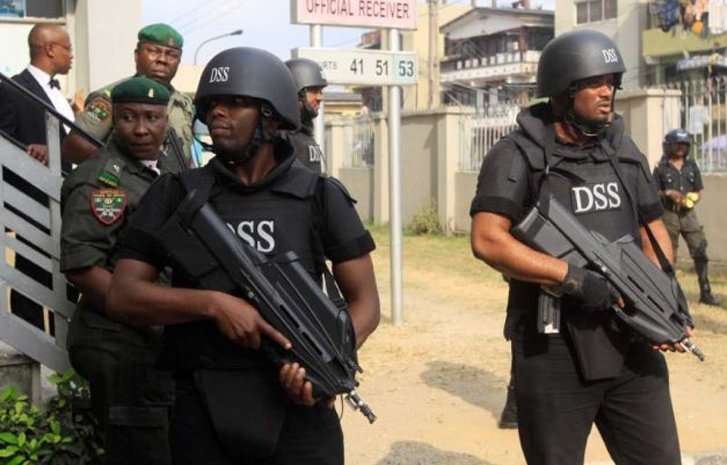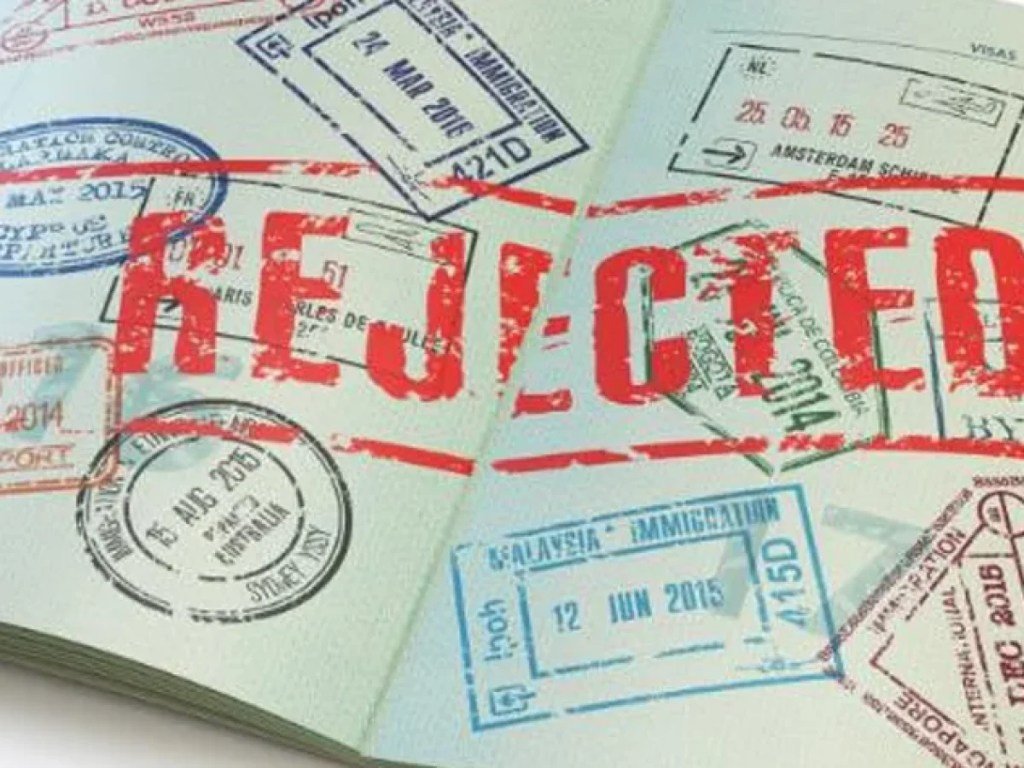
A rejected Nigerian passport visa page stamped “Denied” reflects the harsh reality many applicants face in 2025, as visa refusal rates surge across the U.S., UK, and Schengen zones.
ABUJA, Nigeria – Nigerian visa denials are surging in 2025, shutting doors for students, professionals, diplomats, and athletes alike. With nearly half of all applications rejected, Nigeria now ranks among the highest globally in visa refusal rates. This unprecedented crisis is reshaping migration, diplomacy, and opportunity for millions of citizens. From soaring Schengen and F-1 student visa refusals to the financial drain of non-refundable fees, Gom Mirian analyses the costs, causes, and consequences of Nigeria’s growing visa rejection problem.
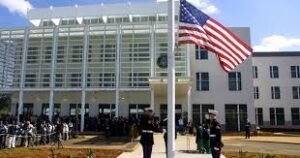
Rising Rejections: The Numbers Behind the Crisis
In 2025, 48.5 per cent of Nigerian visa applications were denied, ranking the country third globally after Afghanistan and Syria.
In Europe, Schengen visa refusals climbed to 45.9 per cent in 2024, compared to 40.8 per cent in 2023, according to the European Commission. The United States has seen similar trends. In 2022, two out of three Nigerian student visa applicants were rejected, and by 2023, F1 visa denials rose to 36.25 percent.
Even official delegations are affected. In early 2025, General Christopher Musa, Nigeria’s Chief of Defence Staff, revealed that half of his delegation was denied visas to Canada for an official mission.
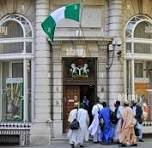
Sports and Culture on the Sidelines
The effects extend beyond diplomacy. In February 2024, the Super Eagles were forced to cancel a friendly match against Argentina in the United States after players failed to secure visas.

Nigerian artists and performers have also faced increasing difficulties, restricting cultural exports and limiting the global reach of the country’s booming music, film, and art industries.
These obstacles reinforce the perception that Nigerians face disproportionate scrutiny, even when requirements are met.
The Financial Toll: Non-Refundable Losses
Visa rejections cost Nigerians millions every year. In 2024 alone, applicants lost £2 million in rejected UK visas, according to the LAGO collective.
The European Union earned €3.4 million from rejected Nigerian Schengen applications in 2023. Between mid-2023 and mid-2024, the United Kingdom generated over $24 million from Nigerian visa applicants.
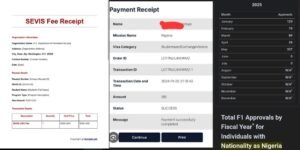
The United States is particularly costly. Each Nigerian F-1 student visa applicant pays $185 for the application and $350 for the SEVIS fee—a combined $535. While exact application numbers are not provided, in 2023, the U.S issued approximately 7,500 F-1 visas to Nigerian students, according to available data on the U.S Department of State website.
The U.S. collected over $4 million (N4.01 billion) from Nigerian students, figures estimated from the available data, many of whom still faced rejection.
Beyond the official fees, corruption fuels desperation. Allegations of reselling visa appointment slots persist, with desperate applicants paying as high as ₦300,000 to secure a slot. An embassy worker in Abuja, who requested anonymity, confirmed:
“The issue is not really directly from the embassy per se but people who secure visa appointments in bulk from the embassy. I learnt some are reselling to desperate applicants as high as ₦300,000 but I don’t have an idea how they do it.”
Exclusive Voices: Applicants in Crisis
For applicants, the consequences are devastating. Many lose not only money but also years of education and opportunities.
Sultan, a Nigerian student who travelled to Ghana to process his application, shared his ordeal:
“For me guys I have tried four times this year at the embassy, but I have been very unfortunate by not securing any approval till I have exhausted my pocket. Currently I have I-20 for spring 2026 but with zero funds that can enable me to reschedule an interview in December.”
Olubunmi, another applicant in Nigeria, recounted his long struggle:
“I got admitted in the US in fall 2024, I applied for a visa appointment and was given November 2025, perhaps the academic year must have elapsed by that date, so I quickly requested for an emergency appointment providing all documents for verification but after months of waiting it was rejected, probably because I didn’t use an agent for my application. I deferred my admission to fall 2025, eventually went for the interview in June 2025 and was denied. After which I used an agent, paid a fee of ₦350,000 and got rescheduled instantly for July. I went again, but it was still rejected.”
The emotional toll is crushing.
“I’m emotionally broke. I was not even given the chance to present my proof of funds, or my case. The VO just told me based on our policies now, we are not approving F1 visas. Good luck next time,” Olubumi added.
Africa Health Report findings from June and July 2025 suggest a disturbing trend: F-1 visa approval rates were zero, meaning no Nigerian applicants were granted visas during those months.
Even top officials are not spared. After Canada denied visas to senior military officers, General Musa described the incident as a “wake-up call” for Nigeria to strengthen sovereignty. National Security Adviser Nuhu Ribadu echoed these fears, warning, “If that can happen to the Chief of Defence Staff, then I am worried for an average Nigerian.”
Africans frequently complain of inconsistent U.S. visa decisions. South African lecturer Sikhumbuzo Maisela told CNN that one applicant’s violation affects everyone:
“It makes it harder for the next applicant, even if they are fully compliant, to be granted the same opportunity.”
New U.S. Screening: Social Media Under the Microscope
In August 2025, the United States introduced new visa rules requiring applicants to disclose all social media handles used in the last five years. Consular officers now screen digital activity for signs of political violence, antisemitism, extremist support, hostility toward U.S. values, criminal behaviour, or plans to overstay.
Critics argue the policy adds a new layer of surveillance, punishing applicants for out-of-context jokes or political opinions.
The Bigger Picture: Inequality and Distrust
The crisis reflects deeper inequalities in global mobility. Wealthier nations profit from Nigerian visa fees while denying entry, creating what analysts call “reverse remittances”—a steady outflow of money from poorer to richer countries.
At the same time, Nigeria’s economic instability, corruption, and insecurity feed doubts about the intentions of its citizens abroad, weakening their chances even when they are qualified.
Rebuilding Trust and Credibility
A retired deputy controller of immigration described a troubling trend: professionals resigning, selling property, and taking loans to leave Nigeria.
This desperation damages the country’s reputation and undermines the naira. He argued that Nigeria must rebuild foreign policy capacity by appointing ambassadors and investing in missions abroad. More importantly, tackling insecurity, corruption, and economic mismanagement is essential to restoring international trust and improving visa outcomes.
Locked Out but Not Defeated
Visa denials have become a defining obstacle for Nigerians in 2025. From students and athletes to business leaders and government officials, the barriers highlight Nigeria’s internal struggles and the external scepticism it faces. It is obvious, the crisis is no longer just about visas but about trust, perception, and international standing.
Until Nigeria strengthens its domestic systems and global relations, its citizens may continue to face closed doors abroad—no matter how deserving they are.




